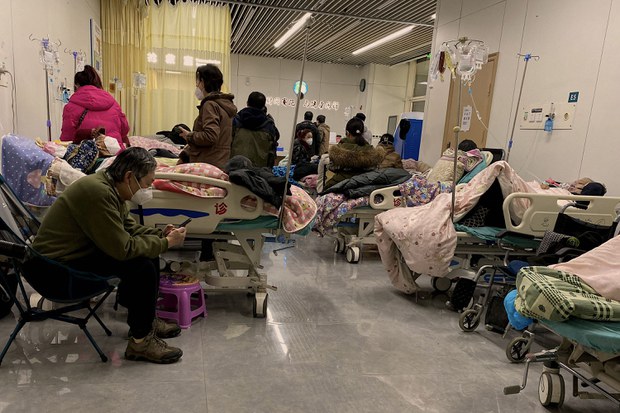INTERVIEW: ‘Three years of zero-COVID, and what has it achieved?’
Share

COVID-19 patients lie on beds at Tianjin Nankai Hospital in Tianjin, China, on Wednesday, Dec. 28, 2022.
Hu Peng doesn’t have much to celebrate this New Year. His 90-year-old father died of COVID-19 on New Year’s Eve in the northern Chinese city of Tianjin after suffering cardiopulmonary failure.
Hu spoke to Radio Free Asia about the harrowing scenes in hospital, as the virus wreaks havoc in Tianjin amid a nationwide wave of sickness and death that has followed the lifting of the zero-COVID policy.
“I called the emergency number, 120, but they said there were 90 people ahead of me in the queue,” Hu said. “Eventually they asked me which hospital we were going to, and I told them the Second Hospital of Tianjin Medical University.”
“The guy told me not to even think about going there because there are currently long lines coming out of the hospital gates,” Hu said. “So he arranged for us to go to the ER at Tianjin Hospital, which was packed full of people.”
“The corridors were full of people lying down next to each other, and ICU beds were hard to come by,” he said. “The doctors told me they usually only treat orthopedic cases, but there were four elderly people there over the age of 80.”
“They said it wasn’t even their specialty.”
The emergency room was so crowded that there was nowhere to sit, Hu said.
“There was an 89-year-old patient next to my dad, whose daughter said she wasn’t even able to get him onto the general ward of the Tianjin No. 1 Traditional Chinese Medicine Hospital, despite having a former classmate who is a departmental director there,” he said. “So that’s why they had come to the ER.”
Another nightmare
Hu’s father remained at the hospital for four days, but eventually died of COVID-19, plunging Hu into another kind of nightmare: trying to book a funeral home and cremation services in the middle of a wave of deaths across the country.
“Basically, if you don’t have any connections, you won’t even be able to get a vehicle to come pick up the body from the hospital morgue,” Hu said. “I have a former classmate who runs a funeral home, and they sent a car pretty quickly to pick up the body.”
“When we got to the funeral home, it was packed with people,” he said. “They told me there that they used to cremate a little over 40 bodies a day, but they are now cremating 240 a day.”
“The guy said the bigger funeral homes are cremating 500 to 600 a day,” he said.
China said last week that it has been fully “transparent” about its COVID-19 reporting, amid criticism on social media over the government’s reporting of the outbreak and widespread pressure on funeral homes as deaths skyrocket.
Funeral home staff and local residents have told Radio Free Asia that bodies are piling up in people’s homes awaiting cremation across China, as funeral homes work round the clock and recruit more staff to transport the dead amid a nationwide outbreak of COVID-19 that followed the loosening of restrictions.
What has it achieved?
Hu said he wants to know what the point of the past three years of rolling lockdowns, mass tracking and surveillance and compulsory testing programs was, if they could be so rapidly abandoned.
“Three years of zero-COVID, and what has it achieved? We can’t get hold of antivirals or over-the-counter fever medicines.”
Chinese tech giant Tencent last month set up a social media platform in a bid to help people share common fever medicines amid a nationwide run on medicines that has spread beyond China’s borders, as Chinese nationals tap friends and relatives overseas for supplies.
China’s National Health Commission said last week that it will no longer be publishing daily COVID-19 infection figures, as the virus rips through the population.
“They recruited all of those white-clad enforcers, built a bunch of quarantine facilities and made everyone do PCR tests, and basically wasted all of those medical resources,” he said.
“They could have ended zero-COVID six months ago, or they could have ended it in six months’ time. Either would have been better than ending it now, just as we’re coming into winter, when the elderly are prone to getting sick,” Hu said.
“Doing it now seems like it’s just sending all the old people to their deaths.”
Translated by Luisetta Mudie. Edited by Malcolm Foster.







